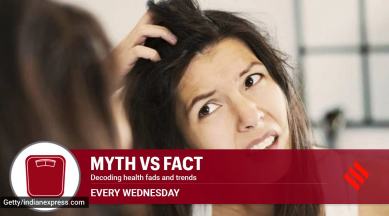Is dandruff causing your hair loss? What’s the real reason for your thinning hairline?
Most patients do not understand the difference between hair fall and hair loss. And dandruff certainly doesn’t cause either, says Dr Arvind Kaul, senior consultant dermatologist at Max Multi Speciality Centre, Panchsheel Park

Twenty-nine-year-old Sandhya Mukul literally had a hair-raising moment one morning when she found strands of her hair, all tangled up, spread across her white pillow. Just then, she had this itchy feeling on her scalp and she dug her nails into it, releasing the dust of dandruff on the collar of her night shirt. Was dandruff causing her hair fall? Must be, she thought. Till she walked into the consultation room of Dr Arvind Kaul, senior consultant dermatologist at Max Multi Speciality Centre, Panchsheel Park. “Most of my patients do not understand the difference between hair fall and hair loss. And dandruff certainly doesn’t cause either,” he says.
WHAT IS HAIR FALL? WHAT IS ITS LINK WITH DANDRUFF?
monthly limit of free stories.
with an Express account.
Hair fall is when you shed strands of your hair beyond the normal count of 50 and 100 a day. “When the body sheds significantly more hair every day, you have what is called hair fall. This happens completely due to outside triggers or environmental reasons like pollution. For example, most hair fall cases are a result of weight loss, pregnancy, micro-nutrient deficiency, worklife stress, emotional trauma, surgery or febrile diseases, treatments like chemotherapy or radiation,” says Dr Kaul. Usually, the hair fall becomes visible a few months after the stressful event. But this is like moulting and is therefore, temporary. As soon as your body readjusts and heals, the excessive shedding stops. Usually, hair fall lasts six to nine months or till such time as you keep reacting to stressors.
“When your scalp is not healthy, there is inflammation, increasing the possibility of fungal illnesses and flaking, or dandruff. Now this causes itchiness, which leads to scratching. This affects some hair follicles, loosening and damaging them, resulting in some hair fall. That’s why dandruff is wrongfully believed to be leading to hair fall. That’s why scalp hygiene is very important, and shampooing regularly is the only answer to keeping fungal illnesses at bay. Do not stop it at any cost thinking you will lose more hair,” advises Dr Kaul. Malassezia is a fungus found on most people’s scalps. However, it can trigger the growth of extra skin cells, which on dying, cause dandruff.
WHAT’S HAIR LOSS? DOES DANDRUFF HAVE A ROLE?
You know you are prone to hair loss when your once luscious mane thins out steadily and you start developing bald patches. “This is almost always genetic. A woman with hereditary hair loss may report gradual thinning from the forehead, a widening of parting and a receding hairline. Men who have hereditary hair loss tend to develop a receding hairline or a bald patch that begins in the centre of the scalp. These require separate interventions than those for standard hair loss. A dermatologist can tell you whether you have hair loss or excessive hair shedding,” says Dr Kaul.
Other reasons for hair loss could be hormonal changes, ageing, an autoimmune condition called alopecia areata and immune system disorders, he adds. Dandruff has no role here.
PREVENTIVE THERAPIES
Hair fall can often be taken care of by medicated shampoos (none of which are known to have caused hair loss), addressing the vitamin and micro-nutrient deficiency with proper medication and supplements. “Depending on the severity of hair loss, the dermatologist can recommend long-term medical intervention, medication along with some interventions like transplants, platelet-rich plasma therapy, and infusion of growth factors in the blood. Drugs like Minoxidil and Finasteride help in growing hair. Peptides can be used to improve the size of our hair follicles. The thickness of hair follicles makes our hair appear thicker. Copper peptides help improve blood flow to the scalp, which ensures fuller growth,” explains Dr Kaul.